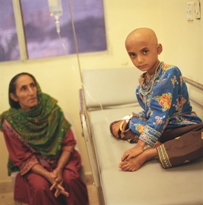Cancer
 In 2008, 7.6 million cancer deaths occurred worldwide. About 60% of cancer deaths occur in low-income and middle-income countries and this number is likely to increase in the future. It is estimated that cancer kills more than a quarter of a million people each year in the WHO Eastern Mediterranean Region alone.
In 2008, 7.6 million cancer deaths occurred worldwide. About 60% of cancer deaths occur in low-income and middle-income countries and this number is likely to increase in the future. It is estimated that cancer kills more than a quarter of a million people each year in the WHO Eastern Mediterranean Region alone.
The largest increase in cancer incidence in the next 15 years is also likely to be in the Eastern Mediterranean Region, taking into account the trends for all related risk factors. The most frequent cancers in the Region are breast cancer in females, and lung and bladder cancers in males.
The projected increase in cancer can be attributed to population ageing, better detection and registration, and most importantly, to increased exposure to risk factors. The most important of these factors is tobacco consumption. Other risk factors include unhealthy diet, physical inactivity, other behavioural and lifestyle changes, pollution and increased exposure to industrial and agricultural carcinogens.
The WHO Regional Office is working closely with Member States to overcome these challenges and achieve the objectives of the regional strategy for cancer prevention and control, including palliative care.
National databases on cancer are either lacking or are not up to date in many countries of the Region. WHO is working with Member States to establish national cancer registries, in collaboration with the International Agency for Research on Cancer (IARC).
Information resources
Publications
Guidelines for management of breast cancer [pdf 810 kb]
Guidelines for the early detection and screening of breast cancer [pdf 472.90kb]
Policy documents
A prioritized research agenda for prevention and control of noncommunicable diseases
Prevention and control of noncommunicable diseases: report of the Secretary-General [pdf 134.10kb]


